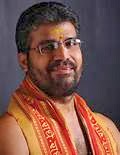Is dharma absolute or does it need interpretation?
On Dharma :
In any given situation we should do what we need to do.
Let us take the example of Lord Rama.
He is severely criticized for his abandonment of Sita.
How do we explain this?
After all “Ramo vigrahavan dharmaha’, he is the embodiment of dharma or righteousness.
How could he justify doing that?
Rama had many roles to play, such as those of a king and husband.
On the one hand, his subjects were criticizing him for keeping Sita in his home.
Whether the criticism was right or wrong, this is how it was.
On the other hand he had his duty as husband to his wife.
If he played the role of a husband knowing that his wife is chaste, and ignored what his subjects said, then he would not be pleasing them.
“Ranjanath rajaha’, or the one who pleases his people, is called raja or king.
Thus, if he wanted to make his wife happy, he had to make his subjects unhappy, and if he wanted to make them happy instead, he had to make his wife unhappy.
So he had two conflicting demands.
In fact this happens to all of us.
There are many conflicting demands in our life.
For example, Pujya Swamiji is teaching a course to 100 students and somebody invites him to give a talk for 2 days.
Should he go or not?
If he goes to deliver the talks, what happens to the students attending the course?
If he doesn’t go, what happens to the other people?
One has to take a decision.
This is where the interpretation of value comes in.
Even though there are universal values, e.g., “I should not do unto others what I do not want done unto me”, these rules need to be interpreted in every situation.
Dharma always depends upon time, place and condition.
Lord Rama interpreted that his duty or demands as a king was more important than his duty as a husband.
You can fulfill the demand that you consider most important in a given situation.
For example, when you are at work, your duty as an employee becomes more predominant than your duty as a father.
When you come home, your duty as a father becomes more important than your duty as an employee.
Thus you will have to determine what, in a given situation, the most important role for that situation is.
There is no general rule about it.
This is where we have to use our sense of judgment.
We can be wrong, but then we can learn.
But at least we would have tried to do our best and been sincere. If we are sincere, in time, we will learn whether we were right or wrong, because the result will reveal it.
Satsang with Swami Viditatmananda Saraswati
Arsha Vidya Gurukulam.




Comments